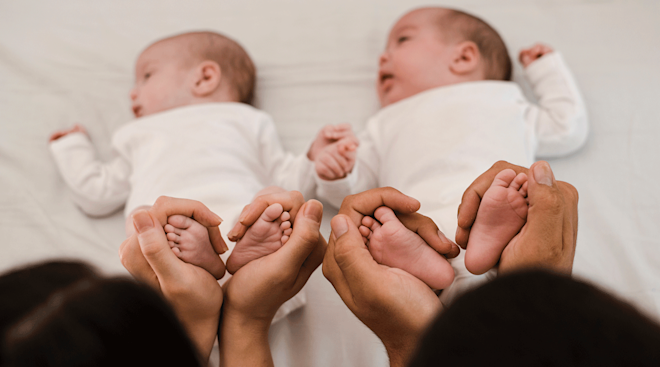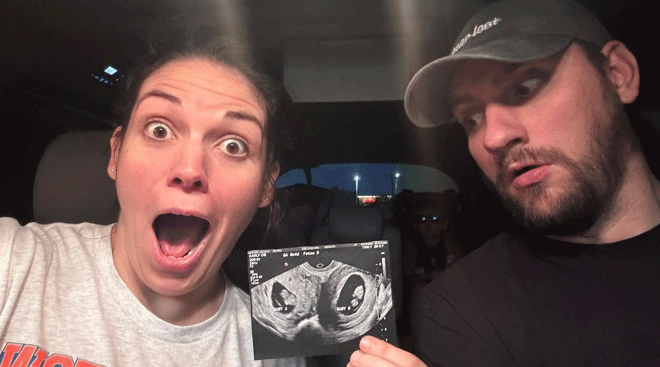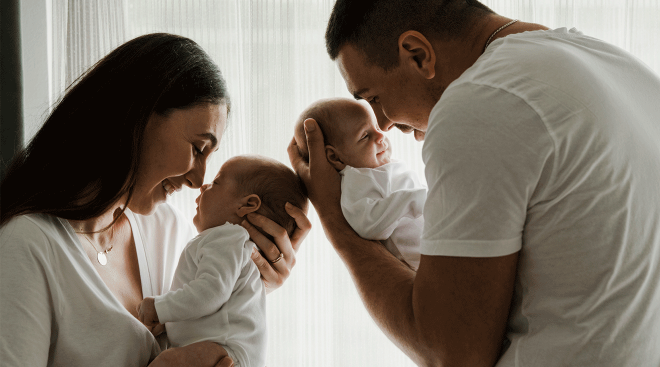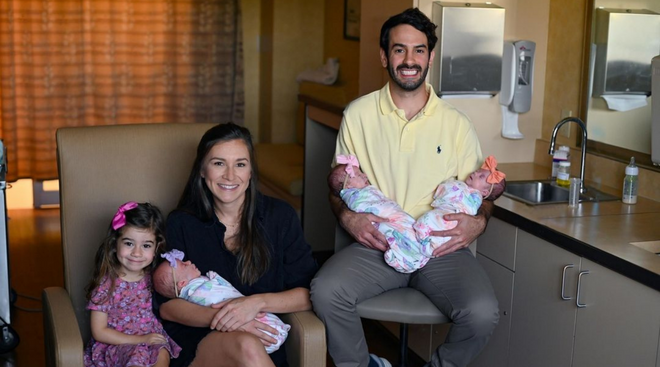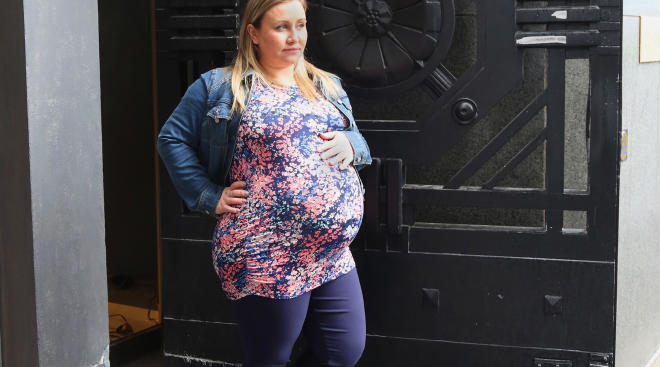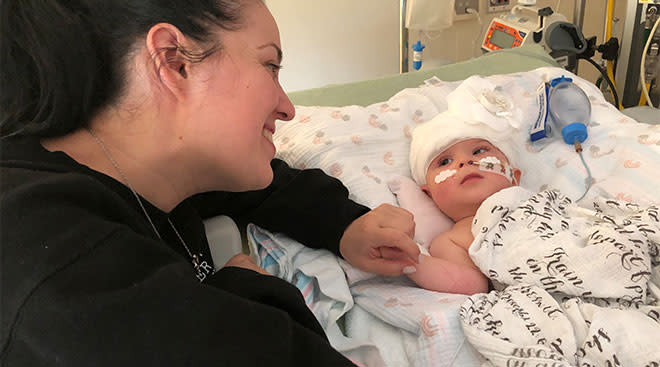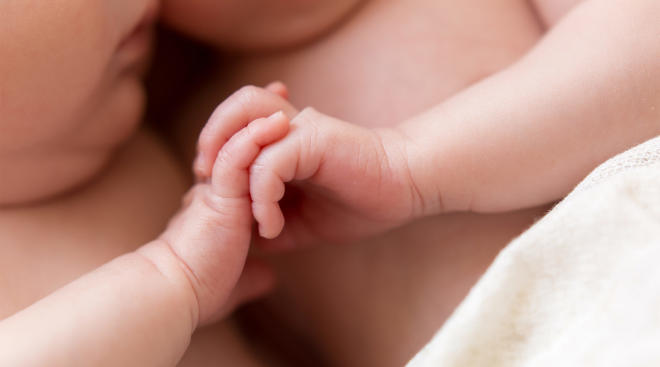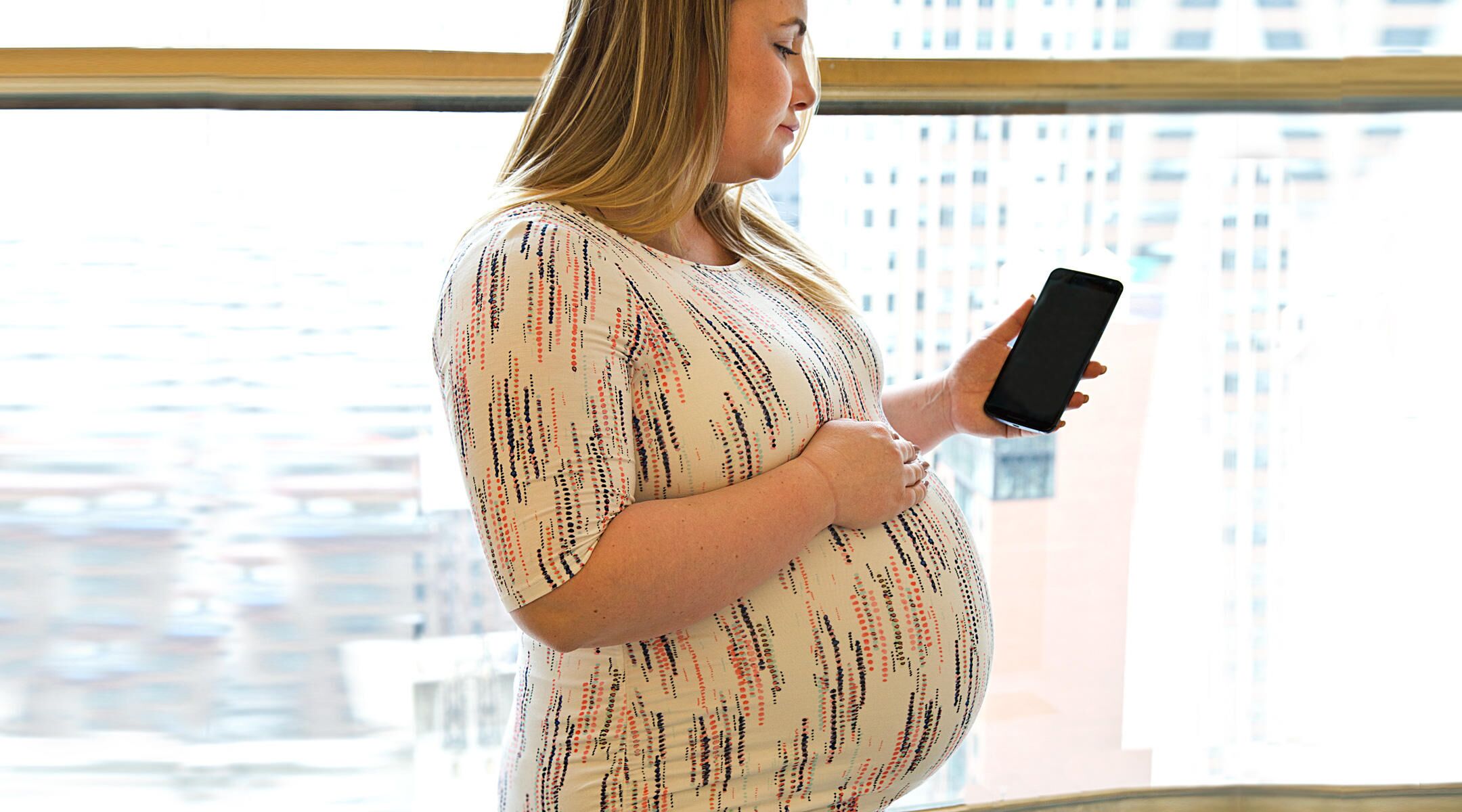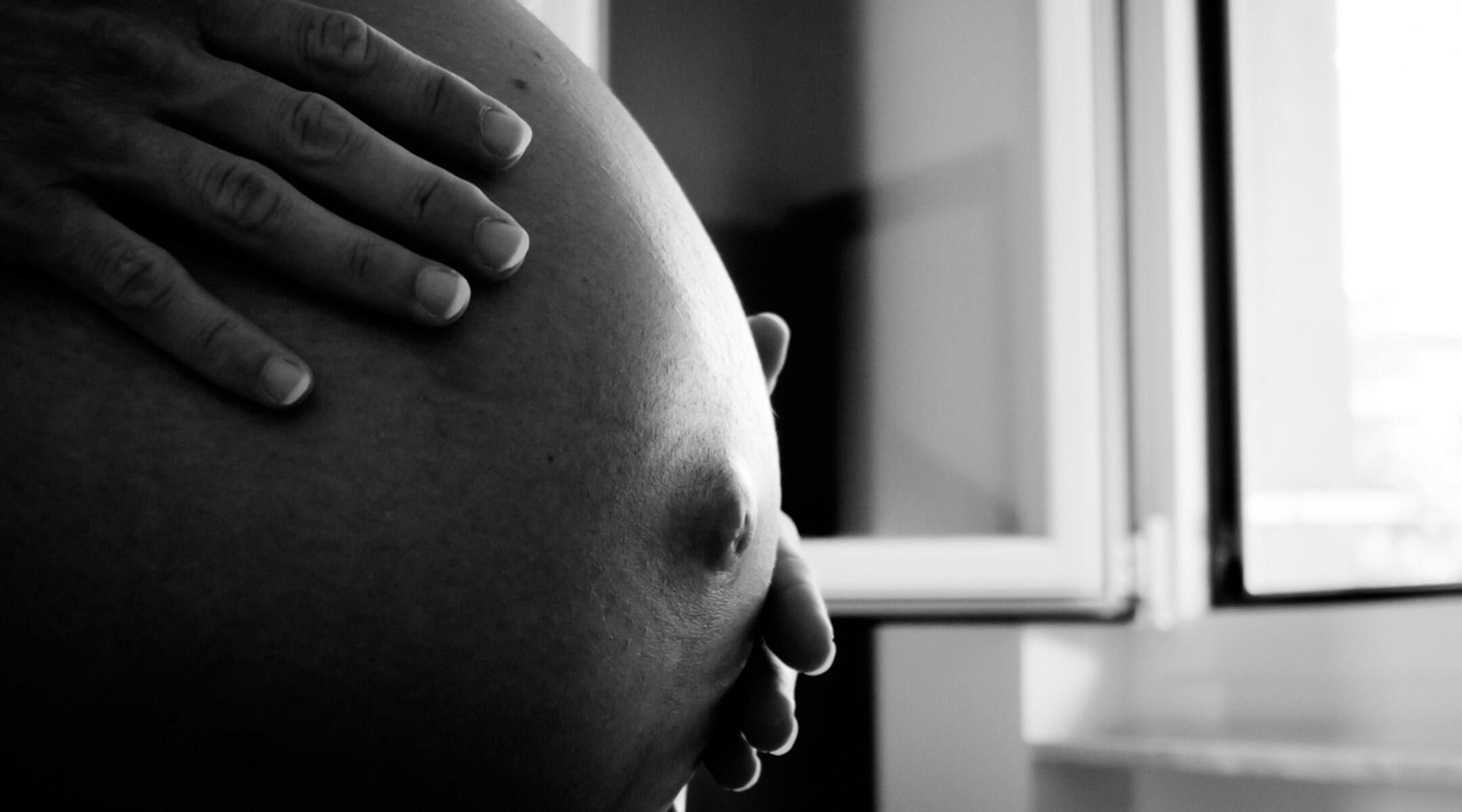What to Know About Vanishing Twin Syndrome and Its Effect on Pregnancy
A twin pregnancy can be really special, as it offers double the love and excitement. But it can also be stressful. Doctors often categorize twin or multiple pregnancies as high-risk for complications and monitor them closely. One of the increased risks of a twin pregnancy is the miscarriage of one twin, called vanishing twin syndrome. Though the remaining baby generally goes on to have a healthy delivery, it can be a heartbreaking loss for parents who were told they were expecting twins. Read on to learn about vanishing twin syndrome and what it may mean for your pregnancy.
Miscarriage is an unfortunate possibility for any pregnancy, although experts say that the more babies you carry during a pregnancy, the higher the risk of miscarriage. The chance of a twin miscarriage that affects both babies is around 5 to 10 percent, says Robin Kalish, MD, FACOG, a specialist in high-risk pregnancies. But statistically, the type of loss that most commonly affects twin pregnancies is called vanishing twin syndrome, also known as disappearing twin syndrome, which involves the loss of one baby.
According to the American Pregnancy Association (APA), vanishing twin syndrome was first recognized by experts in 1945. It describes the spontaneous loss of one of the babies in a twin or multiple pregnancy. Because it typically occurs very early in pregnancy, once the baby ceases to develop, the fetal tissue is often absorbed by the other twin in-utero or by the mom’s body, thereby “vanishing” from the uterus. It can also attach to the placenta and come out during delivery, says Daniel F. Roshan, MD, a maternal fetal specialist at Rosh Maternal & Fetal Medicine in New York City. Like in all other types of miscarriage, the vanishing twin sadly cannot reappear.
Vanishing twin syndrome is diagnosed more frequently these days than in decades past due to the use of ultrasound in early pregnancy: It’s said to affect up to 30 percent of twin or multiple pregnancies, according to Kalish. And it may be identified more commonly in IVF pregnancies since earlier ultrasounds are likely to be scheduled.
Moreover, certain factors may put the pregnancy at an increased risk for vanishing twin syndrome. Most cases of vanishing twin syndrome occur in women over 30 years old, according to the APA. A 2021 analysis also found it affects 20 to 30 percent of pregnancies achieved with assisted reproductive techniques, such as IVF. While these numbers sound high, the risk of twin miscarriage decreases significantly as the pregnancy progresses (more on this below.)
Vanishing twin syndrome usually occurs within the first 12 weeks of pregnancy. The risk is highest in the first trimester, although it drops significantly once a fetal heartbeat is established, Roshan says. A 2003 study shows that the risk for twin miscarriage once the babies’ heart beats are detected is around 7 percent. This is actually lower than the risk in singleton pregnancies once a heartbeat is established, which the study found to be approximately 12 percent. Risk of miscarriage continues to decrease as the pregnancy progresses: At 9 weeks gestation the risk drops to just under 5 percent and at 13 weeks it’s 2 percent.
Experts aren’t sure what causes vanishing twin syndrome, but, according to the APA, many vanishing twins have been found to have chromosomal abnormalities, while the surviving twin is usually healthy. For this reason, experts, including Kalish and Roshan, believe vanishing twin syndrome could be a result of genetic or structural fetal abnormalities or even improper umbilical cord implantation.
Similarly, Roshan says there’s not much known on how to prevent vanishing twin syndrome. His advice to moms expecting twins is to follow the standard health recommendations—take your prenatal vitamins, eat a healthy diet and avoid exposure to harmful agents, including alcohol and tobacco.
Because it happens so early in the pregnancy, there usually aren’t any signs or symptoms of vanishing twin syndrome. Some women might experience vaginal bleeding, says Kalish. A smaller group of women may also experience more noticeable miscarriage symptoms, including uterine cramps and pelvic pain.
Due to the general lack of symptoms, vanishing twin syndrome is only diagnosed through an ultrasound. “Measuring pregnancy hormone levels, such as beta-hCG, is not precise enough to diagnose this,” explains Kalish, adding that the topic needs to be further studied.
Surviving twins typically have a good prognosis, particularly if the loss of a vanishing twin occurs earlier in the pregnancy. According to the APA, a vanishing twin typically doesn’t require any followup care. But there are few cases in which both experts and the APA say the surviving twin may be at higher risk for complications, including:
- Effects of the circumstances that caused the vanishing twin in the first place
- If vanishing twin syndrome occurs past the first trimester
- If vanishing twin syndrome causes heavy bleeding, uterine cramping and pain
- If the twins came from one fertilized egg that split into two
- If the twins shared one placenta
These circumstances may pose increased risks of pregnancy complications, such as intrauterine growth restriction for the surviving twin, which can cause slowed fetal growth and a low birth weight, Kalish explains. “[But] most pregnancies continue without additional issues,” she says.
While this may all sound disconcerting, both experts reiterate that the prognosis for the surviving twin is generally very good. A loss that results from vanishing twin syndrome can be devastating, but the pregnancy goes on to have lower risk for complications compared to other twin pregnancies, Kalish says.
No expectant mother ever wants to think about pregnancy loss, and vanishing twin syndrome can be confusing and scary, especially because it’s beyond anyone’s control. The best thing you can do is to arm yourself with the facts, take care of yourself and remember that the chances of delivering a healthy baby are high.
It can be difficult to process the loss of a child while carrying another. If you’ve suffered a miscarriage and are grieving, lean on your support system. While your partner and loved ones will be able to offer you solace and strength, talking to a mental health professional will help you process the emotional aftermath. And if you have any questions or concerns about your pregnancy, reach out to your OB or midwife. They’re there to help and will be able to best speak to your specific circumstances.
Please note: The Bump and the materials and information it contains are not intended to, and do not constitute, medical or other health advice or diagnosis and should not be used as such. You should always consult with a qualified physician or health professional about your specific circumstances.
Plus, more from The Bump:
Robin Kalish, MD, FACOG, is a maternal-fetal medicine specialist with expertise in high-risk pregnancies. She is also the director of clinical maternal-fetal medicine at Weill Cornell Medical Center. She earned her medical degree from the University of Tennessee College of Medicine and completed her residency at Winthrop-University Hospital in Mineola, New York. Following her residency, she completed a fellowship in maternal-fetal medicine at Weill Cornell Medical College, where she has been a faculty member since 2003.
Daniel F. Roshan, MD, FACOG, FACS, is a board-certified ob-gyn and maternal-fetal medicine specialist with an expertise in high-risk pregnancies. He is also the director at Rosh Maternal & Fetal Medicine in New York City. After earning his medical degree from Tel Aviv University, Roshan received residency training in obstetrics and gynecology at Maimonides Medical Center in Brooklyn and completed a fellowship in maternal-fetal medicine at Johns Hopkins University in Baltimore. He’s an active member of the American College of Obstetricians and Gynecologists (ACOG) and the American College of Surgeons (ACS).
American Pregnancy Association, Vanishing Twin Syndrome
StatPearls, Vanishing Twin Syndrome, July 2023
Oxford Academic, Risk of spontaneous abortion in singleton and twin pregnancies after IVF/ICSI, August 2003
Learn how we ensure the accuracy of our content through our editorial and medical review process.
Navigate forward to interact with the calendar and select a date. Press the question mark key to get the keyboard shortcuts for changing dates.


































